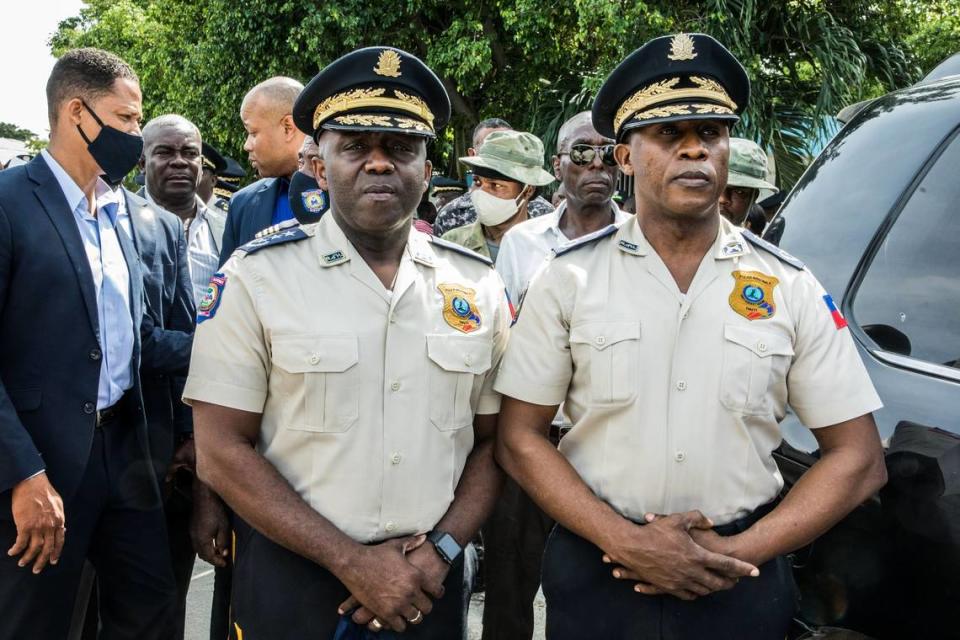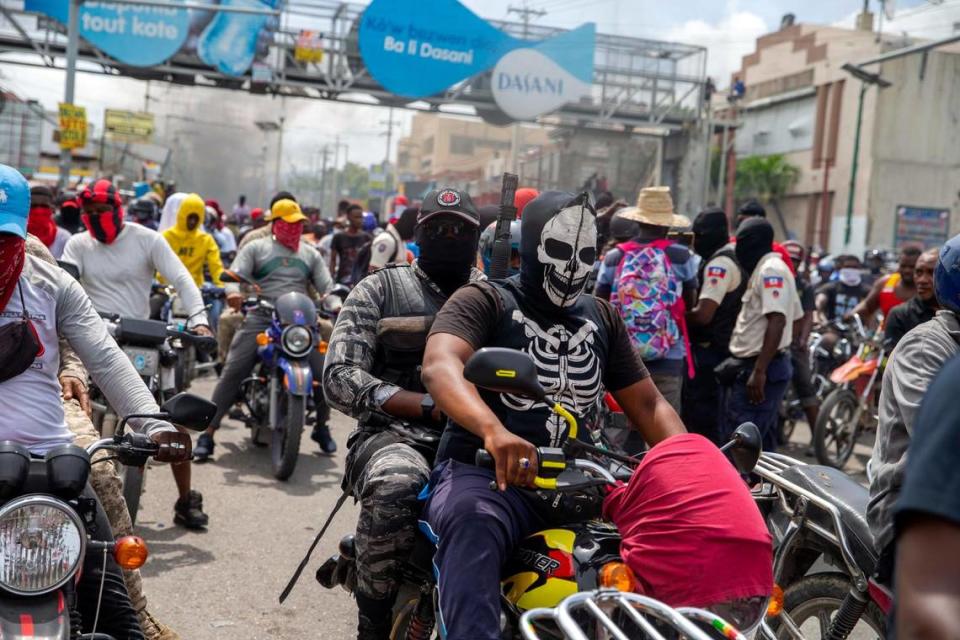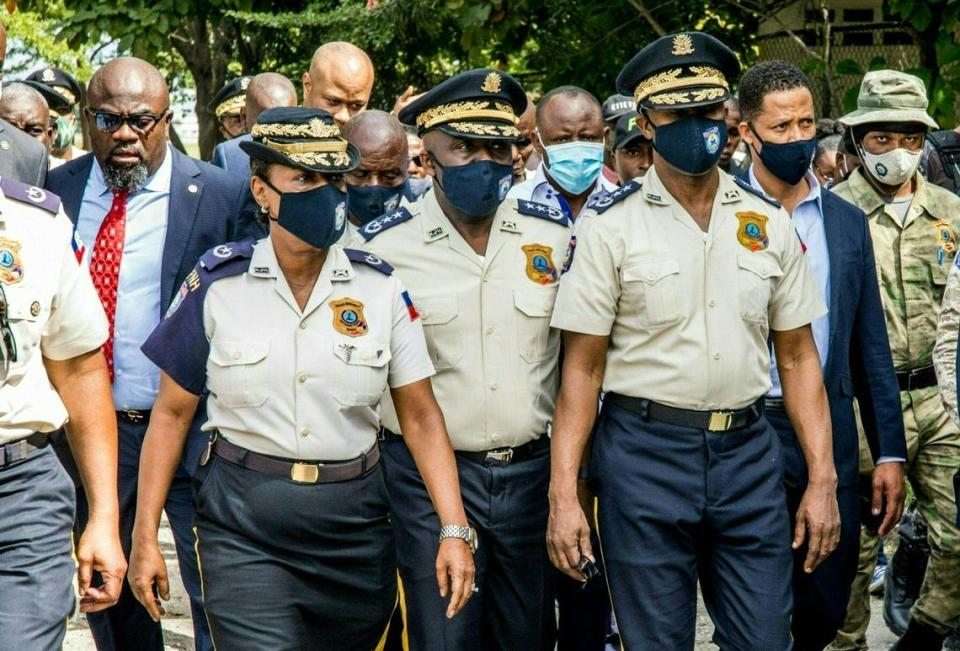Haiti fires its top cop, taps ex-OAS diplomat and police chief to head national police
A Haitian diplomat who last headed his country’s beleaguered national police force 15 years ago, has been given back his old job as the country’s top cop.
Léon Charles, Haiti’s permanent representative to the Organization of American States who also served as chargé d’affaires in its Washington embassy, was installed Monday after being named interim director general of the Haiti National Police in a presidential decree. Charles replaces fired chief Rameau Normil, who was named interim director of the U.S.-backed Haiti National Police 15 months ago by President Jovenel Moïse.
Normil has struggled to restore safety in Haiti following the departure of the last of the United Nations peacekeeping troops in October 2019, and the proliferation of armed gangs throughout the country. His departure and Charles’ naming comes two days before announced anti-government protests on Wednesday to mark the 217th anniversary of the Battle of Vertières, the last major battle of the Haitian Revolution against the French. For the last two years, opposition groups have used the occasion to call for Moïse’s departure.
“I cannot be prime minister and cannot go where I would like,” Prime Minister Joseph Jouthe said Monday as he laid out to Charles what he’s up against and his expectations for the new director general of the HNP. “I would like to see the diaspora come and visit, beautiful women and men with bikinis on sunbathing at the beautiful beaches we have in the country. I would like to hear Christmas carols being sung in all of the streets....But we are so sad that we can’t even sing Christmas carols. Life is already tough and now we can’t move freely. We need peace in the country.”

While the firing of Normil, which had been rumored for days, came as no surprise, the selection of Charles, following the rejection by the U.S. of other replacements, did. A former member of the Haitian military, Charles had his own tumultuous tenure as police chief and has not been an active police officer for over a decade. Some assumed that would have blocked his nomination under Haitian law.
According to Article 21 in the 1994 law that created the Haiti National Police, the head of the force must be selected from among the three central directors in the force or from among the departmental chiefs on active duty. Critics say Charles did not meet any of these requirements given his time away from the force and his role as an ambassador.
The change in command has received mixed reaction even among critics of Normil, who criticized his leadership — and even called for his firing — amid his inability to stem the tide of violence.
“We’re in a situation where there are a lot of problems inside the police and in a context like this, it’s not easy for a director general of the police to give results,” said Gédéon Jean, a lawyer and founder of the Center for Human Rights Analysis who repeatedly called for Normil to take charge of the police and show results. “If things do not change, it’s not Léon Charles who is going to come make a difference.”
On Monday, the Boston-based Institute for Justice & Democracy in Haiti issued its latest report on human rights and rule of law in Haiti. It noted that UN Secretary-General António Guterres in his latest report, focused on ongoing violence by gangs but paid little attention to credible reports from local human rights observers documenting state actors’ complicity in such violence and suggesting political motives.
Victims of violence in Haiti, the organization said, have been left without recourse and perpetrators have been emboldened to spur further cycles of violence and abuse.
A former No. 2 in the police, Normil was tapped in August 2019 to replace ex-police chief Michel-Ange Gédéon, who led the force for over three years. Gédéon had overseen the presidential elections that brought Moïse to power in 2017, the departure of most of the UN troops after 15 years and the arrest of one of Haiti’s most wanted gang leaders, Arnel Joseph. Despite that Moïse, who didn’t get along with Gédéon, chose not to renew him for a second term and selected Normil.

Normil, however, has not had an easy time. His tenure has been marked by high-profile assassinations, soaring kidnappings for ransom, some of which have implicated police officers, and several massacres. Orchestrated by armed gangs in slums around the capital, the violence has left scores dead.
Under Normil, the police faced stinging criticism over their inability to arrest a former cop turned gang leader, Jimmy “Barbecue” Cherizier. Cherizier, who united warring gangs earlier this year under the banner G-9 Families and Allies, has been implicated in several massacres, including the death of dozens of women and children in the La Saline neighborhood in 2018.
Two years later, despite calls by the United Nations for arrests, no one has been held accountable and Cherizier continues to roam free.
In addition to being blamed for the eroding security climate, Normil faced mounting discontent within the fractured force over working conditions. That discontent has led to the formation of two police unions and a fringe group of police officers calling themselves “Fantom 50.” The rogue outfit has been behind several violent protests in Port-au-Prince that involved attacks on government vehicles and buildings.
Unlike his predecessor, Normil held the role as interim director of the police without the benefit of being ratified by Parliament before it became dysfunctional in January. This posed problems and will become an issue for Charles, who also will not have the benefit of a Parliament ratification. As a result, the new chief will be vulnerable to the whims of Moïse, who has vowed to use his reinstituted army to fight bandits, and has been ruling by decree since January.

Charles will also face pressure from both the U.S., which finances the 15,000-plus police force and called on the Haitian government to increase its spending, and the United Nations, which continues to push for the force’s professionalization, expansion and clean-up.
Charles first took charge of the force in the wake of the 2004 bloody coup against then-president Jean-Bertand Aristide and the arrival of an interim-U.S. backed government and UN forces.
Back then, however, Haiti’s armed gang and kidnapping phenomenon was just beginning and mostly isolated to Port-au-Prince, where gun battles between Haitian police and gangs were common.
“Today, it’s the entire country that is gangsterized,” said Jean. “There is not a place in the country today where you don’t have armed gangs.”
Charles was not only blamed for the insecurity, but foreign officials in charge of rebuilding the police, which saw its numbers depleted due to drug trafficking and corruption, questioned his commitment to cleaning up the force. Secret U.S. Embassy cables showed that the embassy also had great concerns about the use of deadly force by the Haiti National Police under Charles’ leadership.
In a June 7, 2005, secret U.S. cable, later revealed by WikiLeaks, CIVPOL Commissioner Dave Beer suggested that within the Haiti National Police “corruption, even in these special units, was endemic and that Charles was unwilling or unable to discipline or arrest officers that everybody knows are corrupt and colluding with the kidnappers.”
A month later Charles was out and replaced by Mario Andrésol. Andrésol went on to rebuild the force and served seven years, from July 2005 to August 2012, as Haiti National Police chief, the longest tenure to date.

